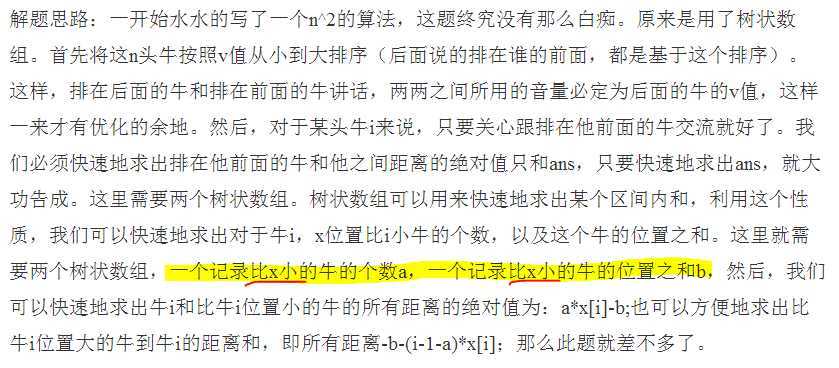标签:style blog http io ar color sp for on
这题是我看了大白书树状数组后刷的第一道题,确实难度不小,所以只好上网找题解了,网上的做法确实精彩。这题的题意主要是有N头牛,每两头牛之间交流的费用为它们的距离乘上两者音量的最大值(即max(v(i),v(j))),然后统计所有牛两两交流的总费用。一开始能想到的做法便是O(n2)的暴力枚举了,当时的我也只能想到这样的复杂度,很纳闷怎么能和树状数组搭上边呢?然后看了别人的题解后才惊叹其思路之妙。
在博客 http://www.cnblogs.com/Fatedayt/archive/2011/10/08/2202439.html 上说得很详细,附上其主要的思路:

已经说得很详细了,即统计某头牛i 时,通过排序和预处理可以把原本的O(n)查询下降到O(logn),确实很厉害,也很难想到。我结合网上其他人的题解半抄半改写出如下代码:
1 #include<cstdio> 2 #include<cstring> 3 #include<algorithm> 4 using namespace std; 5 typedef long long LL; 6 const int maxn= 20020; 7 8 inline LL lowbit(LL x) { return x&(-x); } 9 10 struct treeArray{ 11 LL c[maxn], n; 12 treeArray(LL n= 0): n(n) { memset(c,0,sizeof(c)); } 13 LL sum(LL x) { 14 LL ans= 0; 15 while(x){ 16 ans+= c[x]; 17 x-= lowbit(x); 18 } 19 return ans; 20 } 21 void add(LL x, LL d){ 22 while(x<=n){ 23 c[x]+= d; 24 x+= lowbit(x); 25 } 26 } 27 } Count(20003),dist(20003); 28 29 struct Cow{ 30 LL v,x; 31 bool operator <(const Cow c2) const { 32 return v<c2.v; 33 } 34 } cow[maxn]; 35 36 int main(){ 37 int n,i; 38 scanf("%d",&n); 39 for(i=1; i<=n; ++i) 40 scanf("%lld%lld",&cow[i].v,&cow[i].x); 41 sort(cow+1,cow+n+1); 42 LL ans= 0, alldist= 0; 43 for(i=1; i<=n; ++i){ 44 LL x = cow[i].x; 45 LL num = Count.sum(x); 46 LL lessdist = dist.sum(x); 47 ans += cow[i].v*(num*x-lessdist+alldist-lessdist-(i-1-num)*x); 48 Count.add(x,1); 49 dist.add(x,x); 50 alldist += x; 51 } 52 printf("%lld\n",ans); 53 return 0; 54 }
其中,Count.sum(x)表示统计比x小的牛的个数(在上图中就是a),dist.sum(x)表示统计比x小的牛的位置之和(在上图中为b);alldist即前i 头牛的所有距离(可以认为是以原点作为标准),其余的变量名也不难理解。码完后才感到树状数组真是太强大了,不得不赞!
标签:style blog http io ar color sp for on
原文地址:http://www.cnblogs.com/Newdawn/p/4161986.html